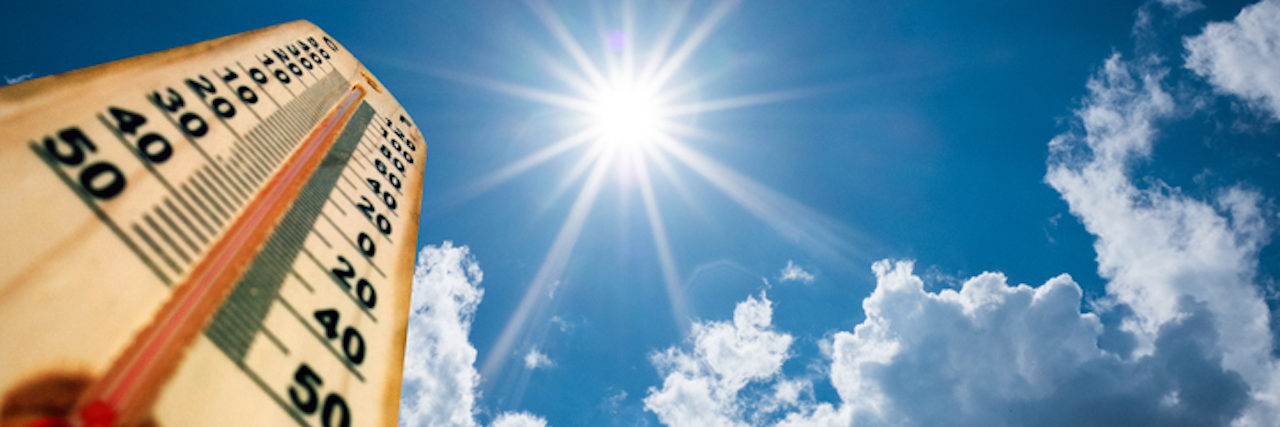The Unexpected Way Climate Change May Interact With Mental Health Meds
It’s likely not a side effect or interaction you hear of often, but many mental health medications make you more sensitive to higher temperatures. When the thermometer starts creeping up into digits above 85 degrees Fahrenheit, you have a higher risk of experiencing mental health symptoms, especially if you take psychiatric medications. Given climate change will increase temperatures around the globe, here’s what you need to know.
On Wednesday, NPR reported the results of an analysis of emergency response calls due to mental health conditions during a 2018 summer heatwave in Baltimore. The heat index at times reached 103 degrees Fahrenheit, and reporters found mental health-related emergency calls rose 40% during the hottest months of summer in Baltimore due to a spike in symptoms. Those taking mental health medications like antipsychotics or antidepressants were especially impacted by the temperature.
“Heat is hard on human beings. Extreme temperatures are hard on human beings,” Ken Duckworth, medical director for the National Alliance on Mental Illness, told NPR. “The particular vulnerability is if you’re taking psychiatric medicines, that can actually make the condition higher risk for you.”
While it seems to rarely come up, experts have known heat has a big impact on people with mental illness since at least the 1970s when mental health institutions observed worsening manic or psychotic symptoms among their patients in the heat. Similar to NPR’s recent analysis, a study in Australia between 1993–2006 found a 7.3% increase in hospital admissions for mental health reasons once the temperature reached 80 degrees. Other studies over the years have replicated these findings. Additional research shows people with mental illness have three times the risk of death during a heatwave compared to those without a mental illness.
A major theory about why mental health emergencies flare during the heat has been traced back to psychiatric medications. Your body uses a self-monitoring thermoregulatory strategy to keep your internal body temperature at an optimal level. Mental health medications interrupt your temperature-regulating process, which means your internal temperature rises significantly when it gets hot. Increased internal body temperature can trigger mental health symptoms like mania or psychosis or heat-related complications like heat stroke.
More research is needed to understand the connection, but experts have found the neurotransmitters that help regulate your mood, including serotonin, dopamine and norepinephrine, also help regulate your body temperature. These are the same neurotransmitters targeted by most mental health medications. Adjusting the levels of these neurotransmitters to reduce your mental health symptoms may have unintended consequences that reduce your temperature-regulating system. Antipsychotic, antidepressant, sedative and mood-stabilizing medications, among others, all increase your vulnerability to heat.
You may also be more vulnerable to mental health emergencies in the heat from secondary issues when it’s hard to adjust your actions to account for the heat. For example, when you have a condition like depression that makes it difficult to get out of bed, you may be less likely to drink enough water during a heatwave. If you’re actively experiencing mania or psychosis, you may over-exercise and over-exert yourself in the heat. When it’s hot, it’s also harder to sleep, and disrupted sleep makes you more vulnerable to mental health symptoms.
It’s important to take the heat-related interactions of mental health medications into consideration because temperatures are expected to rise significantly due to climate change in the coming years. According to National Aeronautics and Space Administration (NASA), heat will continue to rise, heatwaves will last longer and the heat will be more intense. “Extreme heat days” will also occur more often, which means additional preventative measures will be needed for the 16.7% of the U.S. population that relies on medications to manage their mental health symptoms.
The Ohio Department of Mental Health suggested some precautions you can take to reduce your risk of a mental health emergency during hot days, including:
- Try to stay cool during the hottest hours of the day by finding air-conditioned spaces, closing curtains and blinds to keep out the sun when it’s hottest and staying in cooler rooms
- Avoid outdoor activities and exercise during the hottest times of the day to prevent extra overheating
- Remember and set reminders to drink more water than usual to stay hydrated and help your body regulate its temperature
- Dress in lighter-colored clothing that fits loosely on your body to allow your skin to breathe
- Try taking a cool shower or bath if you start to feel too hot or overheated
- Eat regular meals to provide your body with energy, salt and additional hydration to support its temperature ability regulations
And, if you find you’re struggling with your mental health in the heat or have concerns about how your medications will be impacted in hotter weather, talk to your doctor about what you should know and how you can cope in the heat.
Header image via batuhan toker/Getty Images

